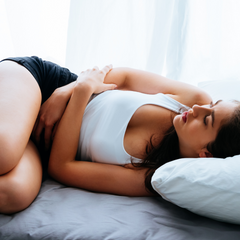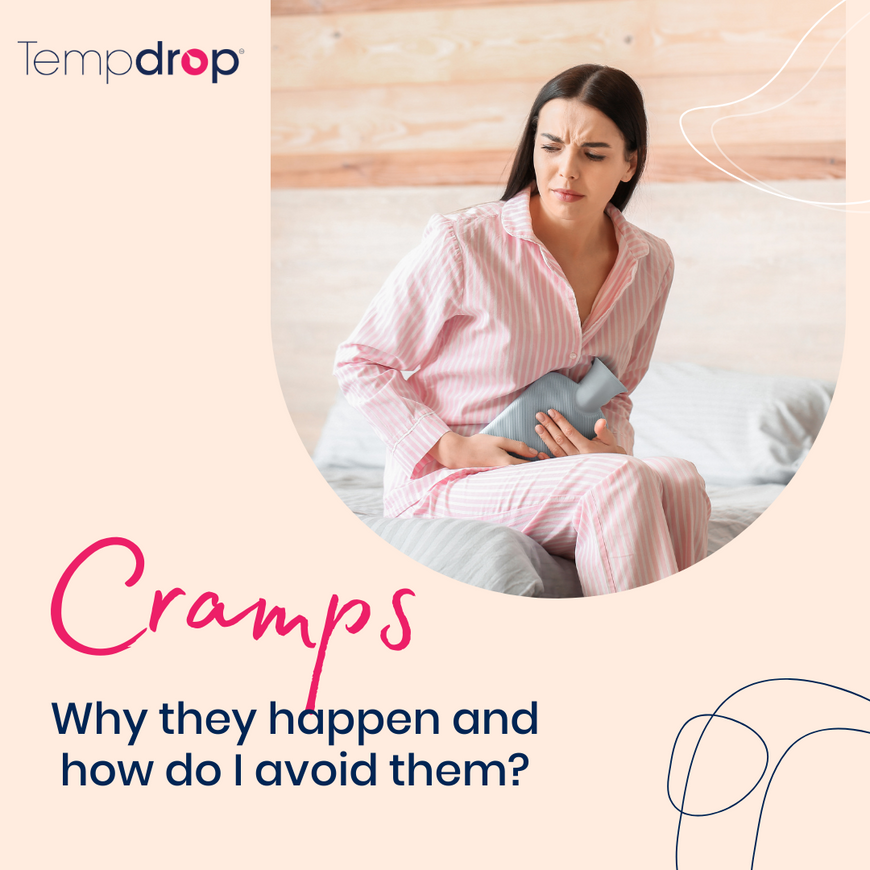Written by Michele Drake, Edited by Gemma Rigby
Menstrual cramps are very common, it's estimated that around 80%* of women experience them, but that does not mean they are normal. A normal, healthy period might cause some discomfort - after all, the uterus does need to contract in order to empty itself of the endometrium (uterine lining). A few minutes or even hours of mild discomfort can be expected. But hours or days of pain is not normal, nor should it be acceptable.
 Some types of dysmenorrhea, or period pain, are severe and require working with a practitioner to address them properly. If you have severe pain, pain that lasts a long time, pain that interferes with your ability to go about your normal life, or pain that doesn’t respond to over the counter pain medicine, you may have an underlying condition that needs to be treated. Some conditions that cause pain as described above are:
Some types of dysmenorrhea, or period pain, are severe and require working with a practitioner to address them properly. If you have severe pain, pain that lasts a long time, pain that interferes with your ability to go about your normal life, or pain that doesn’t respond to over the counter pain medicine, you may have an underlying condition that needs to be treated. Some conditions that cause pain as described above are:- endometriosis,
- adenomyosis,
- uterine fibroids,
- or pelvic inflammatory disease.
The most common causes of cramps are an imbalance of histamine, prostaglandin, or estrogen. We’ll explore these in more detail below.
Root Causes
1. Histamine
Histamine is a chemical messenger released by the body in response to inflammation (such as during menstruation!). Histamine’s purpose is to increase circulation to flush out whatever it is that is causing inflammation. This is why there is a histamine rise when you are exposed to an allergen. Histamine is an important chemical and we do need it to help regulate our gut and help us filter out pathogens. One of its many jobs is to help the uterus contract to empty. The problem is too much histamine can cause intense and painful cramping.
2. Prostaglandin
Prostaglandins are chemical messengers found all over our bodies. They activate when we have an injury or inflammation (hello again, period!). High levels of inflammation cause high levels of prostaglandin. The more prostaglandins you have, the more intense your cramps can feel. Since the uterus is super close to the bowels, prostaglandins can also cause digestive cramps and stimulate bowel movements (yup, prostaglandins are responsible for period poops).
3. Estrogen
Having high levels of estrogen means the endometrium (lining of the uterus) will be thicker. When the endometrium is really full and thick, the uterus may have to work harder to expel it. This can cause really intense cramps.
4. Anatomical differences
The uterus is not in a fixed location for your whole life. It’s actually held in place by around a dozen ligaments, and its position changes. Pregnancy, childbirth, surgery, or abdominal trauma can cause the uterus to tilt in one direction or another. This can also be caused by sitting often, wearing high heels often, or poor posture. When the uterus is tilted, it has to work really hard to empty itself (which means more intense cramps for you).
Treating Painful Cramps

The good news is all of the causes above are treatable - and sometimes even curable! Keep in mind that most of the treatments offered below will take around 3 cycles, or 90 days, to have any measurable effect.
1. Balance histamine level
Some foods are naturally high in histamine. Avoiding these for several days before your period can help. A few of those foods include preserved meats, canned fish, cheese, highly fermented foods.
2. Balance prostaglandin level
Prostaglandins tend to be higher for people who have a lot of omega 6 fats (for example, if you cook with vegetable oil often). Try using oils that are low in omega 6 fats and/or high in omega 3s (think olive oil, avocado oil, coconut oil, flaxseed oil). Taking magnesium may also help (but be warned - too much magnesium can cause loose stools).
3. Balance estrogen level
To lower estrogen, increase your intake of fiber and cruciferous veggies (broccoli, cabbage, brussels sprouts, etc). You can also decrease alcohol and meat consumption. Be conscious of your exposure to endocrine disruptors like cleaning products, plastics, and fragrances.
4. Address anatomical differences
Some massage practitioners are specifically trained in abdominal massage, which may help adjust organ location. You might also find an acupuncturist can help address this.
Living with Cramps
Okay so now you have a long term plan, but what about right now? Many of these solutions take time, but you will still have to deal with cramps in the meantime.

1. Rest
This is the most important healing tool to give yourself! Get enough sleep and move slowly. Listen to your body and don’t push it too far.
2. Heat
Most people have a positive response to period pain when using heat. A hot water bottle or a heating pad on your lower abdomen can be soothing.
3. Epsom Salts
Epsom salt soaks combine a few helpful treatments:
- heat from the bath water
- magnesium which can be absorbed through your skin (from the epsom salt)
- stress relief
3. Vaginal Steaming
Some people have a marked difference in cramping after a few vaginal steaming sessions. If you’re interested in learning more, there are great resources available (and not just for postpartum, either!).
4. A different menstrual product
Honestly, try ditching the tampon. Anecdotally, I have seen a lot of people’s period pain disappear once they stop using tampons. You could switch to a pad or period underwear to avoid obstructing blood flow. Some people also report a huge improvement when they switch to a menstrual cup or disc. You can read more about period care options here.
The most important take-away though is to rememebr period pain is common BUT it is not normal. Remember to listen to your body and try to live in tune with it, rather than fighting against it.

Michele Drake is a Fertility Awareness Educator and advocate with a passion for supporting people with their birth control choices. After witnessing many friends struggle to find their ideal method for avoiding pregnancy, balance their hormones, or achieve pregnancy, she was inspired to empower people with knowledge about their own bodies so that they may make informed choices about their health.
